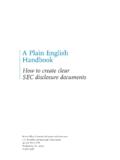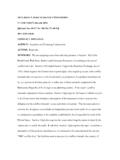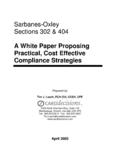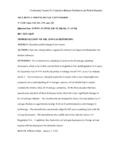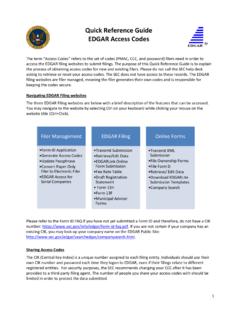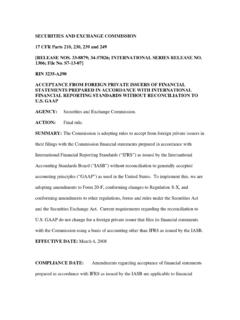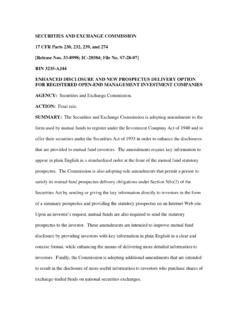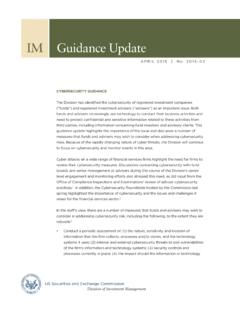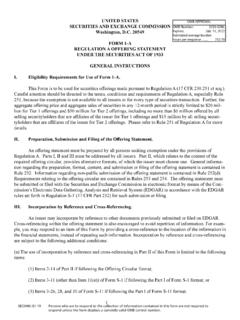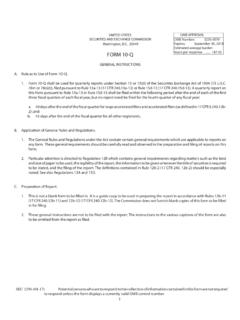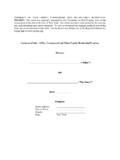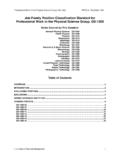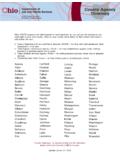Transcription of SECURITIES AND EXCHANGE COMMISSION 17 CFR Part …
1 SECURITIES AND EXCHANGE COMMISSION . 17 CFR Part 275. [Release No. IA-3220; File No. S7-25-10]. RIN 3235-AK66. family Offices AGENCY: SECURITIES and EXCHANGE COMMISSION . ACTION: Final rule. SUMMARY: The SECURITIES and EXCHANGE COMMISSION (the COMMISSION ) is adopting a rule to define family offices that will be excluded from the definition of an investment adviser under the Investment Advisers Act of 1940 ( Advisers Act ) and thus will not be subject to regulation under the Advisers Act. EFFECTIVE DATE: [insert date 60 days after publication in the Federal Register], 2011. FOR FURTHER INFORMATION CONTACT: Sarah ten Siethoff, Senior Special Counsel, or Vivien Liu, Senior Counsel, at (202) 551-6787 or Office of Investment Adviser Regulation, Division of Investment Management, SECURITIES and EXCHANGE COMMISSION , 100 F Street, NE, Washington, DC 20549-8549.
2 SUPPLEMENTARY INFORMATION: The SECURITIES and EXCHANGE COMMISSION is adopting rule 202(a)(11)(G)-1 [17 CFR (a)(11)(G)-1] under the Investment Advisers Act of 1940 [15 80b] (the Advisers Act or Act ).1. 1. 15 80b. Unless otherwise noted, when we refer to the Advisers Act, or any paragraph of the Advisers Act, we are referring to 15 80b of the United States Code, at which the Advisers Act is codified. 2. TABLE OF CONTENTS. I. BACKGROUND. II. D. ISCUSSION. III. PAPERWORK REDUCTION ACT. IV. ECONOMIC ANALYSIS. V. FINAL REGULATORY FLEXIBILITY ANALYSIS. VI. STATUTORY AUTHORITY. TEXT OF RULE. I. BACKGROUND. On October 12, 2010, the COMMISSION issued a release proposing new rule 202(a)(11)(G)-1 that would exempt family offices from regulation under the Advisers We proposed this rule in anticipation of the Dodd-Frank Wall Street Reform and Consumer Protection Act's (the Dodd-Frank Act )3 repeal of the private adviser exemption from registration contained in section 203(b)(3) of the Advisers Act, effective July 21, 2011, upon which many family offices currently The Dodd-Frank Act creates in its place a new exclusion from the Advisers Act in section 202(a)(11)(G)
3 Under which family offices, as defined by the COMMISSION , are not investment advisers subject to the Advisers Historically, family offices that fell outside the private adviser exemption have sought and obtained from us orders under the Advisers Act declaring those offices not to be investment advisers within the intent of 2 See family Offices, Investment Advisers Act Release No. 3098 (Oct. 12, 2010) [75 FR. 63753 (Oct. 18, 2010)] ( Proposing Release ). family offices are entities established by wealthy families to manage their wealth and provide other services to family members. See section I of the Proposing Release for a discussion of family offices. 3 Pub. L. No. 111-203, 124 Stat. 1376 (2010), at section 403. 4 15 80b-2(b)(3). This provision exempts from registration any adviser that during the course of the preceding 12 months had fewer than 15 clients and neither held itself out to the public as an investment adviser nor advised any registered investment company or business development company.
4 5 See section 409 of the Dodd-Frank Act. 3. section 202(a)(11) of the Advisers Recognizing this past practice, section 409 of the Dodd-Frank Act instructs that any family office definition the COMMISSION adopts should be consistent with the previous exemptive policy of the COMMISSION and recognize the range of organizational, management, and employment structures and arrangements employed by family offices. 7. We received approximately 90 comments on the proposed rule, most of which were submitted by law firms representing family Many urged that we adopt a broader exemption to accommodate typical family office structures that were not reflected in our previous exemptive Some urged us to include exceptions in various aspects of the rule to allow individuals or entities with no family relations to nevertheless receive investment advice from the family office without the protections of 6 See, , Bear Creek Inc.
5 , Investment Advisers Act Release Nos. 1931 (Mar. 9, 2001). (notice) [66 FR 15150 (Mar. 15, 2001)] and 1935 (Apr. 4, 2001) (order); Riverton Management, Inc., Investment Advisers Act Release Nos. 2459 (Dec. 9, 2005) [70 FR. 74381 (Dec. 15, 2005)] and 2471 (Jan. 6, 2006) (order). We are troubled by comment letters we receive by counsel to some family offices that appear to acknowledge that their clients were operating as unregistered investment advisers, although they were not eligible for the private adviser exemption and had not obtained an exemptive order from us. We note that an adviser may not rely on exemptive orders issued to other persons. 7 Section 409(b) of the Dodd-Frank Act. Section 409 also includes a grandfathering clause that precludes us from excluding certain family offices from the definition solely because they provide investment advice to certain clients and had provided investment advice to those clients before January 1, 2010.
6 See section 409(b)(3) of the Dodd-Frank Act. 8 The public comments we received on the Proposing Release are available on our website at 9 See, , Comment Letter of the American Bar Association, Section of Business Law and Section of Real Property, Trust and Estate Law (Nov. 18, 2010) ( ABA Letter );. Comment Letter of Perkins Coie/Private Investor Coalition Inc. (Nov. 11, 2010). ( Coalition Letter ); Comment Letter of Tannenbaum, Helpern, Syracuse & Hirschtritt LLP (Nov. 18, 2010) ( Tannenbaum Letter ). 4. the Advisers Some disputed our interpretation of the legislative direction we received to define the term family office consistent with our previous exemptive After careful consideration of these comment letters, we are adopting rule 202(a)(11)(G)-1, with certain modifications from our proposal as further described below.
7 II. D. ISCUSSION. We are adopting new rule 202(a)(11)(G)-1 under the Advisers Act to define the term family office for purposes of the Act. family offices, as so defined, are excluded from the Act's definition of investment adviser, and are thus not subject to any of the provisions of the Act. The scope of the rule is generally consistent with the conditions of exemptive orders that we have issued to family offices. As with the proposal, and as discussed in more detail below, our final rule in some cases has modified those conditions to turn the fact-specific exemptive orders into a rule of general applicability and to take into account the need for certain clarifications and further modifications identified by commenters. As we discussed in the Proposing Release, our orders have provided an exclusion for family offices because we viewed them as not the sort of arrangement that the 10 See, , Comment Letter of Miller & Martin PLLC (Nov.)
8 18, 2010) ( Miller Letter ). (recommending that non- family clients be permitted de minimis investments in family limited liability companies, partnerships, corporations and other entities and be permitted de minimis ownership stakes in the family office itself); Comment Letter of Porter Wright (Nov. 10, 2010) (supporting various forms of non- family client investment through the family office with five percent de minimis maximums for each type of exception). 11 See, , Coalition Letter. 5. Advisers Act was designed to Disputes among family members concerning the operation of the family office could, as we noted in the Proposing Release, be resolved within the family unit or, if necessary, through state courts under laws designed to govern family disputes. In light of the purpose of the exclusion and the legislative instructions we received, we have not expanded the exclusion, as several commenters suggested, to permit family offices to provide advisory services to multiple families or to clients who are not family members, other than certain key employees.
9 The failure of a family office to be able to meet the conditions of the rule will not preclude the office from providing advisory services to family members either collectively or individually. Rather, the family office will need to register under the Advisers Act (unless another exemption is available) or seek an exemptive order from the COMMISSION . A number of family offices currently are registered under the Advisers Act. A. family Office Structure and Scope of Activities As proposed, rule 202(a)(11)(G)-1 contains three general conditions. First, the exclusion is limited to family offices that provide advice about SECURITIES only to certain family clients. Second, it requires that family clients wholly own the family office and family members and/or family entities control the family office.
10 Third, it precludes a family office from holding itself out to the public as an investment adviser. In addition to these conditions, we have incorporated into the rule the grandfathering provision required by section 409 of the Dodd-Frank 12 See Proposing Release, supra note 2, at sections I and II for a discussion of the rationale for the family office exclusion. 13 See supra note 7 and section of this Release. 6. 1. family Clients A family office excluded from the Act is limited to an office that advises only family clients. 14 As discussed in more detail below, family clients include current and former family members, certain employees of the family office (and, under certain circumstances, former employees), charities funded exclusively by family clients, estates of current and former family members or key employees, trusts existing for the sole current benefit of family clients or, if both family clients and charitable and non-profit organizations are the sole current beneficiaries, trusts funded solely by family clients, revocable trusts funded solely by family clients, certain key employee trusts, and companies wholly owned exclusively by, and operated for the sole benefit of, family clients (with certain exceptions).
